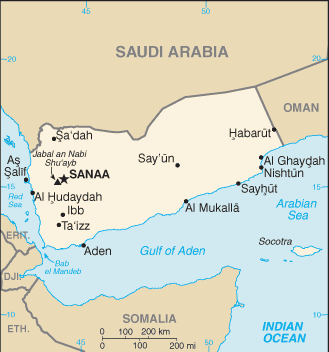As the US turns its focus on Yemen, the nation is presented as a hotbed for al-Qaeda in the Arabian Peninsula (AQAP). And while that is AQAP’s home territory, Yemen is a nation of myriad instabilities, and multiple incipient conflicts that US intervention could bring America directly into. The attempts to establish an independent Islamist emirate with AQAP ties in Abyan Province is the US focus, but is comparatively small among Yemen’s problems.
 Yemen as a whole is rarely particularly united, with the central government based in Sanaa and mostly controlling the area between there and the coasts. Everything else is tribal areas, where heavily-armed tribal militias have shown themselves capable of standing up to the Yemeni military when the situation requires. It was one of these conflicts that saw a Yemeni military helicopter shot down, killing eight earlier today.
Yemen as a whole is rarely particularly united, with the central government based in Sanaa and mostly controlling the area between there and the coasts. Everything else is tribal areas, where heavily-armed tribal militias have shown themselves capable of standing up to the Yemeni military when the situation requires. It was one of these conflicts that saw a Yemeni military helicopter shot down, killing eight earlier today.
Tribal disputes with the government are almost entirely distinct from the AQAP conflict, and while AQAP at time takes advantage of such clashes to establish a foothold in certain areas, the notoriously independent tribes aren’t likely to happily greet a US intervention.
And these on-again, off-again tribal wars are just one concern for the US as it moves into Yemen. Two distinct secessionist movements are also ongoing on opposite sides of the country.
In the north around Sadaa, the Shi’ite Houthis are hoping to carve out independence while being hotly contested by Saudi Arabia and the Yemeni military. The Yemeni government is eager to blame Iran for this movement, though the Houthis’ ambition for autonomy is a long-standing issue.
Meanwhile, the lack of stability in Saleh and now Hadi-ruled Yemen has many people thinking South Yemen should reemerge as an independent entity. The Yemeni military is often cracking down on this entirely non-religious secessionist movement, and it will be yet another one that the US could rapidly get sucked into.


